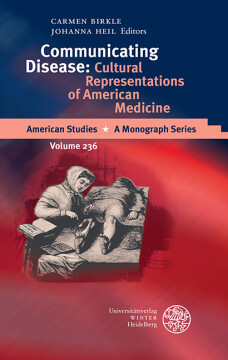
BUCH
Communicating Disease
Cultural Representations of American Medicine
Herausgeber: Birkle, Carmen | Heil, Johanna
American Studies – A Monograph Series, Bd. 236
2013
Zusätzliche Informationen
Bibliografische Daten
Abstract
‘Communicating Disease’ focuses on the intersections of literature and medicine. It unravels the intricate entanglement of culture and disease and is devoted to the representation of life through medical narratives, exploring its value to both the literary critic and the medical practitioner. Grouped in four sections, the contributions to this volume discuss cultural representations of medical practice, the medical profession, diseases and epidemics, and potential healing functions of narratives. Topics range from eighteenth-century Old and New World practices of medicine via the careers of nineteenth-century women doctors and nurses subverting dominant gender norms, to twentieth- and twenty-first-century cognitive sciences; from smallpox epidemics via yellow fever to AIDS and biotechnology; from Alice James and Charlotte Perkins Gilman to Siri Hustvedt and Richard Powers as well as women pathologists on the screen; to be concluded by a transnational reading of the world of medicine in the medium of literature.
Inhaltsverzeichnis
| Zwischenüberschrift | Seite | Aktion | Preis |
|---|---|---|---|
| Table of Contents | V | ||
| CARMEN BIRKLE - Communicating Disease: An Introduction | IX | ||
| Part I: Negotiating Medical Practice | 3 | ||
| MARC PRIEWE - Staging Final Illnesses: Medicine and Religion in Experience Mayhew’s "Indian Converts" | 3 | ||
| MARCEL HARTWIG - “Some with their Fear th’ Infection bring, And only shun the Doctor’s Skill”: Medical Practice and the Paper War during Boston’s Smallpox Epidemic of 1721 | 21 | ||
| SONJA FIELITZ - Live and Let Die: Viewpoints on Aging in Eighteenth-Century Britain | 43 | ||
| MARTIN KUESTER - Cunning Man and/or Shaman? Robertson Davies’s Dr. Hullah | 61 | ||
| STEPHANIE P. BROWNER - Resocializing Literature and Medicine: Poverty, Health, and Medical Science in Postcolonial Literature | 71 | ||
| Part II: Subverting the Medical Profession | 95 | ||
| CARLA BITTEL - A Literary Physician? The Paris Writings of Mary Putnam Jacobi | 95 | ||
| ANTJE DALLMANN - “Doctors Are Never Mistaken”: Doctor Romances and Re-Negotiations of the "Nature" of Marriage in Late Nineteenth-Century America | 119 | ||
| KIRSTEN TWELBECK - How Far Could They Go? Imprisoned Nurses, Unsexed Angels, and the Transformation of True Womanhood in Civil War America | 145 | ||
| KATJA SCHMIEDER - “Do Not Cross” - TV Women Doctors Trespassing on Male Territory | 175 | ||
| Part III: Transmitting Disease | 199 | ||
| IMKE KIMPEL - “Like Hermits in Holes and Caves”: Isolation as a Narrative Mode for Writing the Plague in Daniel Defoe’s "A Journal of the Plague Year 1665" | 199 | ||
| INGRID GESSNER - Contagion, Crisis, and Control: Tracing Yellow Fever in Nineteenth-Century American Literature and Culture | 219 | ||
| ASTRID HAAS - Remedial Laughter: American Stage Comedy about AIDS | 243 | ||
| RÜDIGER KUNOW - The Biology of Community: Contagious Diseases, Old Age, Biotech, and Cultural Studies | 265 | ||
| Part IV: Healing Narratives | 291 | ||
| CHRISTINE MARKS - Metaphors We Heal By: Communicating Pain through Illness Narratives | 291 | ||
| ANCA-RALUCA RADU - Coming to Terms: Narrating Loss in John Banville’s "The Sea" and Richard B. Wright’s "October" | 309 | ||
| PETER SCHNECK - Finding Words for (Not) Losing One’s Mind: Alice James, Charlotte Perkins Gilman, and the Sense of Self in Narratives of Mental Illness | 329 | ||
| ANNA THIEMANN - Shaking Patterns of Diagnosis: Siri Hustvedt and Charlotte Perkins Gilman | 365 | ||
| JOHANNA HEIL - Embedding Richard Powers’s "The Echo Maker" in Narrative Medicine: Narrativity, Delusions, and the (De-)Construction of Unified Minds | 387 | ||
| BIRGIT DÄWES - Traumorama? The Pathological Landscapes of Richard Powers’s "The Echo Maker" | 413 | ||
| DIETRICH VON ENGELHARDT - The World of Medicine in the Medium of Literature: Structures, Dimensions, Perspectives | 431 | ||
| Contributors | 457 |


 Publishing Platform by CloudPublish
Publishing Platform by CloudPublish